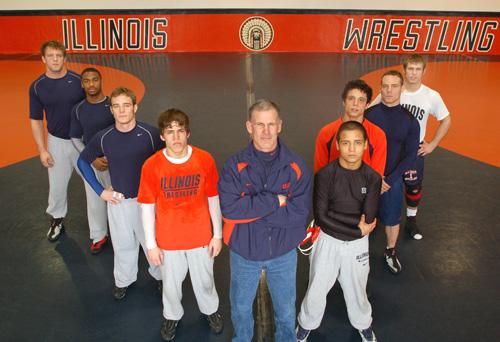Johnson makes his mark

The Illinois wrestling team starters and head coach Mark Johnson, center, pose for a picture during practice at Huff Hall on Thursday afternoon. Johnson will lead his team to East Lansing, Mich., later today for the 2007 Big Ten Championship. Beck Diefenbach
Mar 2, 2007
In the U.S. miracle against the Soviet Union in the 1980 Winter Olympics, forward Mark Johnson scored game-tying goals in the first and third periods in an eventual 4-2 U.S. win.
Five months later, a different American with the same name qualified for the U.S. Summer Olympic wrestling team.
But this Mark Johnson would never get a chance at gold.
The U.S. boycotted the Moscow summer games in protest of the Soviet Union’s invasion of Afghanistan.
“It’s obviously the highlight of my athletic career, making the Olympic team, but maybe one of the most disappointing things not being able to participate,” Johnson said.
Get The Daily Illini in your inbox!
After the decision was made to boycott the games, President Jimmy Carter invited all the Olympians to Washington D.C. for a week.
“World peace is more important than any athletic event. But it really didn’t do any good; the Olympics were a hit in Moscow that year,” Johnson said. “It’s just one of those things that wasn’t meant to be.”
When Johnson retuned home, he handed out awards and read the oath at the Illinois Special Olympics.
“That day all the frustration and the bitterness (of not competing) left,” Johnson said. “Those kids didn’t know. They were just happy to be able to participate and be involved. I’ll always be disappointed, but I’ll never be bitter.”
Johnson’s career, even without Olympic competition, was impressive. The 177-pound Johnson was a two-time All-American at the University of Michigan and a two-time winner at the USA Senior Greco-Roman Championships. He finished 103-18-3 as a Dean’s List student for the Wolverines.
But his next step in wrestling may be even more impressive.
Two years after the Olympic boycott, Johnson jump-started the next phase of his wrestling career. He became an assistant coach at the University of Iowa and eventually head coach at Oregon State.
Thirteen years after the 1980 games, Johnson became the 13th head coach in history for the Fighting Illini wrestling program. He inherited what he calls his dream job but also a team that had not finished better than fourth in the Big Ten since 1965 and had been without a conference championship since 1952.
In 14 years Johnson turned the program into not only a perennial Big Ten contender but one of the nation’s premiere programs. Johnson has led the Illini to nine top-10 national finishes and the school’s first conference title in over 50 years, in 2005. His Illini became just one of three teams to win the Midlands Championships in three consecutive years.
Only Iowa, Oklahoma State and Iowa State can claim more individual national champions since 1992 than Johnson.
The ceiling of Huff Hall is a testament to Johnson’s coaching ability. Seven former Illini players, all national champions, are immortalized on seven different banners running the length of the gym.
And in this, his 15th year, his Illini wrestlers have climbed the national rankings and finished the regular season ranked No. 7. His team is 11-1 overall and finished 7-1 in conference.
This season, for the first time in his tenure, Johnson has used two true freshmen in the Illini’s starting lineup. Freshman John Dergo (184) and Jimmy Kennedy (133) joined an experienced lineup featuring All-American senior Cassio Pero (141) and 2006 national qualifier Gabe Flores (125).
But according to his wrestlers, Johnson’s biggest attributes may not be his ability to coach. Pero and Flores spoke highly of their head coach, not only as a wrestling coach but as a person.
“I think he is a great coach,” Pero said. “He is a good people person, and that’s a great attribute to have.”
Pero’s older brother, Jason, also wrestled for the Illini under Johnson.
“(Johnson) came to my brother’s wedding. That’s an example of what type of person he is.”
As high-school teammates of current and former Illini Troy and Alex Tirapelle, Flores first met Johnson while the coach was on a recruiting visit in Madera, Calif. Johnson convinced Alex to come to Illinois, and Troy and Flores followed.
“Coach Johnson is really an honest guy. He cares about everyone on the team,” Flores said. “He cares what we do on the mat and off the mat. He wants us to grow up, experience college but become men, get our degrees and move on with our lives.”
Twenty-seven years since what Johnson called his unofficial end to wrestling, he is still leaving his mark. This time it is not on his opponents, but on the program.





